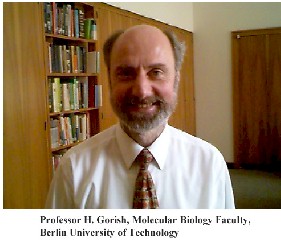
![]()
GERMANY
Contact: Dr. Ing Norbert Gerbsch, Manager, Biotechnology Center
Berlin University of Technology, TU Berlin-Sekr.GG2 Institute fur Biotechnologie
Seestrasse 13, D-13353 Berlin, Tel: +49 30 314-27576, Fax: +49 30 314-27577
Email: jalt1534@mailszrz.tu-berlin.de
 |
 |
Founded in 1997, the Biotechnology Center in Berlin University of Technology (http://www.tu-berlin.de/btc) was probably one of the most impressive institutes I saw in Europe. It covers the following areas:
Microbiology and Genetics, where research is concerned with strain improvement in yeast and filamentous fungi. (Contact Dr. Ulf Stahl, e-mail: ulf.stahl@lb.tu-berlin.de)
Microbial Ecology, where research is in the characterization and isolation of microorganisms from complex communities, and they are "examined for their ecological relevance, their degradation potential for pollutants as well as their potential to produce new secondary metabolites." (Contact Dr. Ulrich Szewzyk, http://www.tu-berlin.de/fb6/microbial_ecology )
In Biochemistry of Natural Products, the group "focuses on drug development, especially on the utilization of biosynthetic systems. Current activities are concerned with the biosynthesis of actinomycin, cyclosporin, enniatin, ergot peptide alkaloids, gramicidin S, penicillin, Surfactin, and taxol. New methods are being developed in protein analysis and mass spectrometric metabolite screening of cells and tissues."
 |
 |
( Contact Dr. Horst Kleinkauf, klei0536@mailszrz.zrz.tu-berlin.de )
Applied Biochemistry concentrates on "microbial degradation of xenobiotics and the enzyme involved, on the biosynthesis of unusual fatty acids and special phospholipids, and on isolation and characterization of enzymes which can either be used for synthetic purposes or in biosensors." ( Contact Dr. Helmut Gorisch, goerish@lb.tu-berlin.de )
Chemical Engineering group deals with biological wastewater treatment with aerobid membrane bioreactors and anaerobic fixed-bed-reactors. (Contact Dr. Matthias Kraume, vtsekr@ivtfg1.tu-berlin.de )
Environmental Engineering group investigates " the kinetics and reaction technology of the biological phosphate removal from wastewater; removal and concentration of surfactants using multi-stage foam fractionation and the development of a rotating disc bioreactor with a textile structure covering which immobilizes higher bacteria concentrations," and other projects. Contact Dr. Udo Wiesmann, vtsekr@zrzsp7.fb10.tu-berlin.de
Bioprocess Engineering group focuses activities in the areas of environmental biotechnology which includes a combination of physical, chemical and biological processes. Some of the research includes hydrothermal upgrading, insect cell culture, immobilization in micro-hollow-spheres, and etc. ( Contact Dr. Rainer Buchholz, buch1534@mailszrz.zrz.tu-berlin.de )
Measurement and Control Engineering group is concerned with the development of control concepts of different aspects of process engineering such as control of fermentation processes. (Contact Dr. Rudibert King, king0630@mailszrz.zrz.tu-berlin.de)
Food Process Engineering group concentrates on "the processing of raw materials rich in starch to intermediate and end-products, and the development of new process for fermentation and enzymic and chemical treatment of starches and flours."
Food Biotechnology and Process Engineering emphasize on "food biotechnology and process engineering on unconventional, ambient temperature processes, such as high electric field pulses, high pressure, supercritical carbon dioxide etc. or on combinations of different processes." (Contact Dr. Dietrich Knorr, knor1531@mailszrz.zrz.tu-berlin.de and http://www.tu-berlin.de/fb15/institute/lmt1/dahlem/index.html
Brewing Technology division focuses on brewing and malting and is equipped with modern laboratories. According to Dr. Gerbsch, brewing biotechnology started long ago in 1870. A bioengineering process improved the quality of barley melts for beer brewing over the years and enabled the German people to develop some of finest beer industries not only in Germany but also around the world. I had the pleasure of sampling a glass of beer produced in the laboratory. ( Contact Dr.Ing. Karl Wackerbauer, bier1331@mailszrz.zrz.tu-berlin.de , http://www.brauwesen.tu-berlin.de)
Molecular Analysis group is "dedicated to the molecular analysis of biotechnological processes for routine and research applications. The biosynthetic pathways leading to low molecular weight compounds of biotechnological interest are elucidated by the whole spectrum of chromatograhic (HPLC,GC) and spectroscopic methods (EL-MS picture). Biotransformations in microorganisms and plants are studied by chiral analysis." (Contact Dr. Roland Tressl, tres1534@mailszrz.zrz.tu-berlin.de, http://www.tu-berlin.de/btc
The general public is not very receptive to genetic engineering and very much against genetic manipulations. Packaged food in the grocery market must be labeled "GENE FREE", otherwise consumers may not buy them. In Austria, Greenpeace activities stage "Genetic Hazard Patrols" to prevent imports of genetically engineered food products like Soya oil. Why is there such skepticism and suspicious about genetic engineering in Germany and neighboring countries? In an article " Genetic Code of Conduct" the writer suggested that "Some observers link it to the traditional German romantic belief in unspoiled nature." Others cite darker fears that genetic tampering could eventually lead to a return of racist eugenics experiments conducted by Adolf Hitler's doctors more than 50 years ago". As a result of public opposition, pharmaceutical companies like Scherring, Roche and Novartis had to move their research facilities to the US and other countries.
On June 7, 1998, the people in Switzerland voted in a national referendum on the question whether they want to "protect life and the environment against genetic manipulation." It was the first time in the history of this nation to vote on such contentious biological issues.
While we should respect the different opinions on scientific issues, those people who opposed biotechnology lost in the referendum.